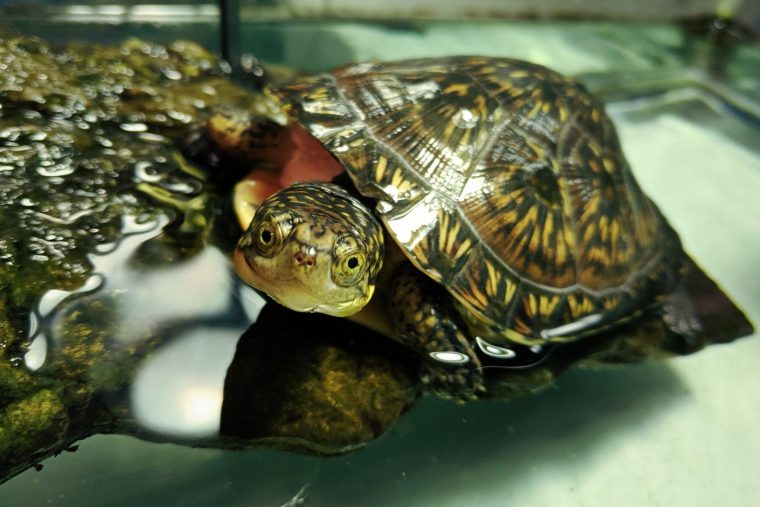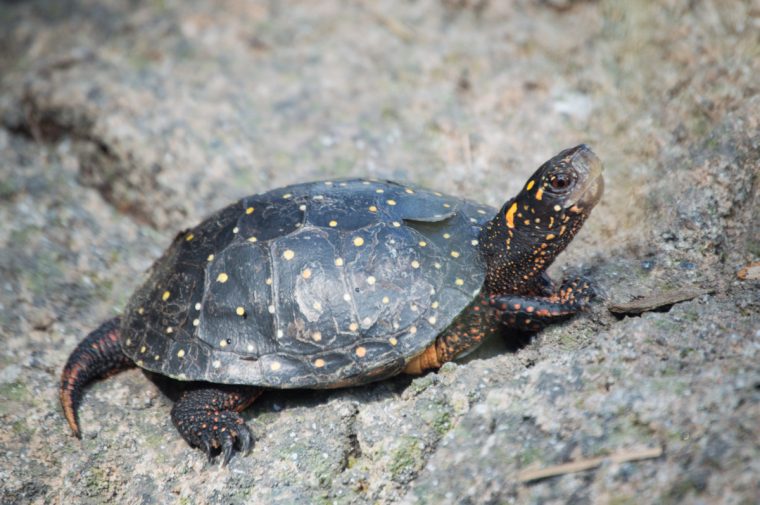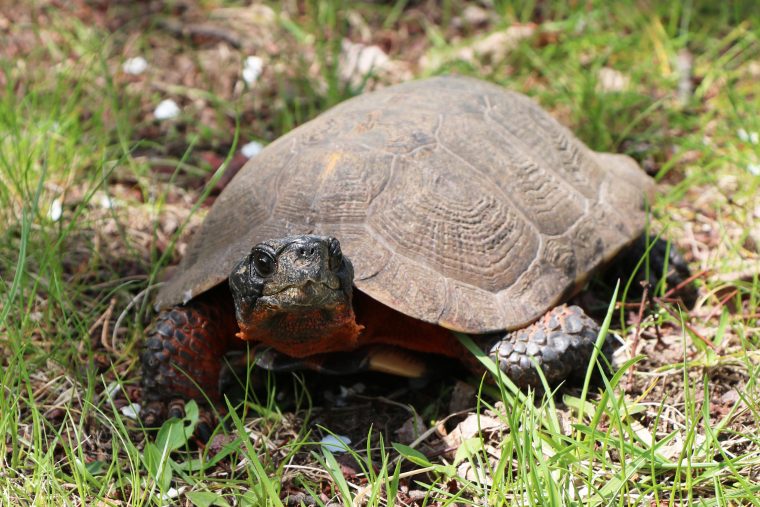Saving Animals From Extinction (SAFE) program focuses on rapid-response care for confiscated turtles

BOSTON, MASS. (March 3, 2020) –The New England Aquarium and Zoo New England are joining forces with animal care specialists, wildlife agencies, and law enforcement to tackle the illegal turtle trade.
The Association of Zoos and Aquariums (AZA) recently approved the formation of a Saving Animals From Extinction (SAFE) program specifically focused on protecting native turtles. The New England Aquarium and Zoo New England, both accredited by AZA, have signed on as partners.
Wildlife traffickers have concocted many schemes to smuggle thousands of turtles out of the United States each year. This illegal trade is fueled by high demand for these reptiles, mostly in Asia, where they are used as pets, food or in traditional medicine. In combination with habitat loss and degradation, illegal trade in turtles has led to the imperilment of more than 60 percent of the world’s 356 turtle species — the highest percentage of any class of vertebrate.
At launch, the SAFE American Turtles program will focus on protecting wood turtles, bog turtles, Blanding’s turtles and spotted turtles. These native species are either already federally threatened or under review by the U.S. Fish and Wildlife Service for future listing.
“New England Aquarium has been deeply involved in turtle conservation for many years, both through our sea turtle rescue program, and our veterinary emergency efforts. In the past five years, we have provided veterinary support to end the tragic and illegal trade in freshwater turtles and tortoises in the Philippines and Madagascar, and we are now strongly committed to supporting such efforts in the United States as part of the AZA SAFE program,” said Dr. Charles Innis, Director of Animal Health at the New England Aquarium. “Many of the endangered species that are targeted by the illegal wildlife trade, such as spotted turtles, wood turtles, and Blanding’s turtles, are found right here in New England. It is tragic to see our native species being illegally collected and sold in this illicit trade.”
Innis is a veterinary advisor for the program and the Species Survival Plan veterinary advisor for spotted turtles.

The SAFE American Turtles program will offer rapid-response to provide care and housing for all confiscated turtles, regardless of species. Once in human care, SAFE partners will explore avenues for entering confiscated turtles into conservation programs or reintroducing them to the wild whenever appropriate.
“I am proud to have the New England Aquarium supporting this important conservation work,” said Dr. Leigh Clayton, Vice President of Animal Care at the New England Aquarium. “Dr. Charles Innis is a world expert in turtle conservation health and I am excited that the animals in this SAFE program will benefit from his knowledge. While our major focus is on ocean health issues, we understand that freshwater and ocean ecosystems are connected and felt it was important to ensure that our specific expertise was matched to this project.”
Dr. Bryan Windmiller, Director of Conservation at Zoo New England, serves on the steering committee for SAFE American Turtles. Zoo New England has long been committed to the conservation of rare and threatened turtle species in eastern Massachusetts and has engaged thousands of schoolchildren and volunteers in impactful, hands-on conservation work on behalf of these species.
“Zoo New England is a national leader in working to conserve and restore populations of four of the turtle species that are the initial focus of the SAFE American Turtles program. With our partners at Mass Wildlife, the U.S. Fish and Wildlife Service, and others, we are helping reverse decades-long declines in critical populations of Blanding’s, wood, eastern box, and spotted turtles in Massachusetts,” Windmiller said. “Turtles are survivors; the oldest species date back to more than 200 million years ago. Yet now, many of the world’s more than 320 existing turtle species need our help to survive and thrive in our increasingly human-dominated landscape. We are excited about this wonderful SAFE initiative, which will help us and other participating institutions coordinate our efforts to better safeguard and restore turtle species that are essential components of healthy wetland and forest ecosystems.”

The Association of Zoos and Aquariums founded the SAFE initiative in 2015 to focus the expertise, resources and audience of its member institutions toward efforts to protect and recover species in need. SAFE American Turtles is the 26th of these programs, which also comprise efforts to protect imperiled animals such as gorillas, jaguars, and whooping cranes, among others. Zoo New England participates in SAFE programs including giraffes, western lowland gorillas, and whooping cranes. The New England Aquarium is also a partner in the SAFE sharks and rays program.
For more information about the AZA SAFE American Turtle program, visit aza.org/safe-species#americanturtle.
ABOUT THE NEW ENGLAND AQUARIUM
Since 1969, the New England Aquarium has been a catalyst for global change for our ocean. Through public engagement, commitment to marine animal conservation, leadership in education, innovative scientific research, and effective advocacy and partnerships, the Aquarium is dedicated to building a vital and vibrant ocean on this blue planet. Learn more: neaq.org.
ABOUT ZOO NEW ENGLAND
Zoo New England manages Franklin Park Zoo in Boston and Stone Zoo in Stoneham. Both are accredited by the Association of Zoos and Aquariums (AZA). Zoo New England’s mission is to inspire people to protect and sustain the natural world for future generations by creating fun and engaging experiences that integrate wildlife conservation programs, research, and education. Like us on Facebook (franklinparkzoo and stonezoo) and follow us on Twitter, Instagram, and Snapchat @zoonewengland.
ABOUT AZA
Founded in 1924, the Association of Zoos and Aquariums is a nonprofit organization dedicated to the advancement of zoos and aquariums in the areas of conservation, animal welfare, education, science, and recreation. AZA is the accrediting body for the top zoos and aquariums in the United States and 11 other countries. Look for the AZA accreditation logo whenever you visit a zoo or aquarium as your assurance that you are supporting a facility dedicated to providing excellent care for animals, a great experience for you, and a better future for all living things. The AZA is a leader in saving species and your link to helping animals all over the world. To learn more, visit www.aza.org.
MEDIA CONTACTS:
Pam Bechtold Snyder, psnyder@neaq.org; 617-973-5213
Brooke Wardrop, 617-989-2030, bwardrop@zoonewengland.org
Diana Brown McCloy, diana@teakmedia.com, 978-697-9414
